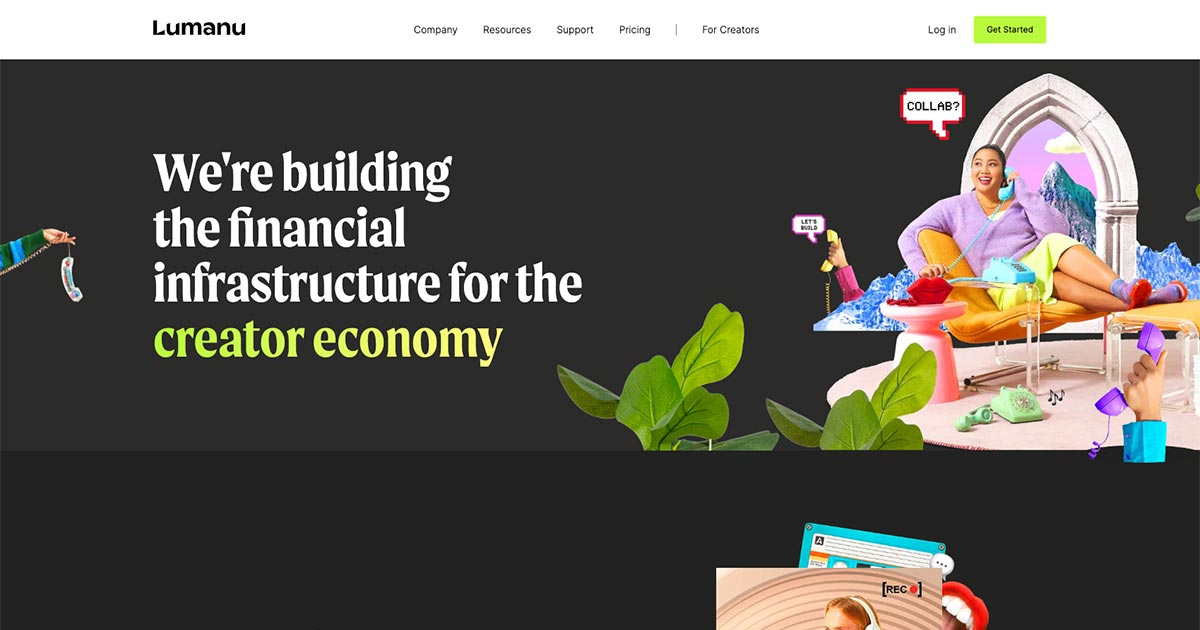Lumanu Profile

Last Updated: By TRUiC Team
Lumanu is a fintech startup offering an innovative payments and financing solution built for the creator economy.
Interview With Tony Tran
Describe your product or service:
“Lumanu is a payments and financing solution for the creator economy. We help agencies, managers, and creators collect payments, payout to vendors/partners, and get instant working capital. We are a venture-funded startup and have raised $18 million to date.
Lumanu's partners include some of the top digital and media agencies as well as creators. Awarded as one of top 10 most innovative companies of 2022 by Fast Company and one of 14 transformational creator economy startups of 2022 by Business Insider.”
Describe your company values and mission:
“We help solve the financial pain points of solopreneurs, freelancers, and small businesses so they can spend more time focusing on growing their business, doing what they excel at, and less time on the administrative work of getting paid.”
How are you funded? I.e. type of funding, number of funding rounds, total funding amount.
“VC: $16 Million through Series A.”
How did you come up with and validate your startup idea? Tell us the story!
“My family were political refugees from Vietnam, and we immigrated to South Carolina when I was young. My personal experience as an immigrant led to a passion for fostering inclusion, creating community, and advocating for those who also don’t fit the typical mold. After graduating from MIT, I worked at McKinsey and found along the way that I had to do things differently and overcorrect for the bias I encountered.
My co-founders and I built Lumanu to democratize the entire creator economy so that all creative entrepreneurs — from photographers to designers to influencers to agency owners — have access to the business tools, payment options, and professional community that will help them succeed.”
How did you come up with your startup's name? Did you have other names you considered?
“The idea came from my wife — we were looking for something that conveyed ‘shining a light’ onto the complicated and anxiety-inducing world of business problems.”
Did you always want to start your own business? What made you want to become an entrepreneur?
“Yes! I grew up watching my parents and siblings start their own businesses to make a living when it was clear that their lack of formal education in Vietnam prevented them from getting more lucrative jobs here in the US. As I got older and graduated college, I also realized that my personality and strengths lend themselves more to being an entrepreneur, where I can focus on the problems I want to solve, not problems that I’m told to solve.”
What was the biggest obstacle you encountered while launching your company? How did you overcome it?
“Very early on, it was extremely challenging for me to get funding. I lacked the network, and my personality and background made it hard to build one. Investors tend to ‘pattern match’ to other successful founders, and as a Vietnamese immigrant, there weren’t too many like me.
One of my mentors gave me invaluable advice to embrace my differences, my origin, and how those things uniquely tie to what I’m doing. As soon as I stopped mimicking other founders and what I had read online, I still got ‘nos,’ but the ‘maybes’ turned into ‘yeses,’ and we were on our way!”
Feeling inspired? Learn how to launch your company with our guide on how to start a startup.
Who is your target market? How did you establish the right market for your startup?
“Our target market are creative businesses of all sizes – from freelancers and creators to digital agencies. Ultimately, all these businesses face the same set of problems: how can I save time by automating all the admin work that goes into collecting payment, paying vendors, and managing my business? We identified early on that time is the most valuable resource for our target market. Our users reinvest the time we save them back into their business: establishing partnerships, finding more clients, and delivering exceptional work.”
What's your primary marketing strategy?
“Put the customer first. Lumanu was founded with a culture of understanding and empathy for our customers. For example, when you are writing ad copy or making a sales presentation, use terms that your customers are already using. Also, don’t forget that everyone is human. Your product may be the best thing ever, but it still requires humans to buy in and dedicate time and resources to give your product a shot. Approach every marketing and sales conversation through a human-centered lens. Acknowledge that there are a lot of things — work and life — that may be on your prospects' plates besides you.”
How did you acquire your first 100 customers?
“Sales. One-on-one conversations that were spurred by introductions or cold outreach. Early on, these conversations were exclusively led by myself and my co-founders since we couldn’t afford sales folks! There are no shortcuts for the first 100 customers, especially when Lumanu has not yet established brand awareness. We treated each of these initial conversations as research calls more than strict sales calls. Sometimes a ‘no’ is just as valuable as a ‘yes,’ if it helps inform our positioning and product strategy to win the next set of customers.”
What are the key customer metrics / unit economics / KPIs you pay attention to to monitor the health of your business?
“We track two metrics religiously: TPV [total payment volume] and MAU [monthly active users]. TPV indicates Lumanu’s share of our target market. The more payment volume that flows through Lumanu, the more successful we are at establishing ourselves as the primary way for creative businesses to pay and get paid. MAUs are an input variable into TPV to ensure that we’re building sustainable growth – that our users are getting value out of Lumanu, so they come back month after month. Without tracking MAUs, it’s easy to trick ourselves into thinking we’re succeeding when we could have a leaky bucket.”
What's your favorite startup book and podcast?
“‘HyperGrowth’ by David Cancel really drives home the notion of putting the customer first. As a startup, your customer is your stakeholder. From building the product to decisions around marketing and sales, you want to make sure you’re 100% focused on the customer. It also speaks to the importance of developing autonomy within your team. People don’t want to be treated like bio-robots. They want to be told the ‘why’ and then be empowered to figure out the ‘how,’ regardless of role or seniority.”
What is a song or artist that you listen to for motivation?
“So funny little story – I don’t have a favorite song or artist. I have this radio playlist on Spotify that I’ve built over the years. It’s a blend of EDM, covers, and gaming music. This playlist has been with me through all my good and bad times and always gives me a boost when I need it.”
Is there a tool, app, or resource that you swear by to help run your startup?
“Asana and Coda are two tools we use a lot at Lumanu. We use Asana to manage all of our projects — from product to GTM. We use Coda as an internal wiki and place to “shape” project requirements (i.e., establish the what/why/how) before fully committing to the work.”
What is something that surprised you about entrepreneurship?
“How much guilt can accompany the decisions I make on a daily basis and the power it can wield. Maybe it’s something small like pushing off a meeting or declining an introduction. Or maybe it’s something larger like separating ways with an employee or ending a relationship with an advisor. No matter the situation, guilt can be a challenging emotion to process and diffuse. Luckily I’ve learned how to separate and contain it so that it doesn’t overwhelm me or interfere with my decision-making.”
How do you achieve work/life balance as a founder?
“Achieving work/life balance can be challenging, but it’s a big priority for me. One way I do this is by setting boundaries to protect my mental space, time, and well-being. When I don’t have the capacity or time to deal with a particular problem, it’s okay to delay addressing it until the time is right. I also make time and space to block my calendar to take mental health breaks throughout the day. Whether it’s going for a walk, going grocery shopping, meditating, or watching a TED Talk, taking a break to clear my head and shut off my busy brain can help me reset and recharge, especially at stressful times. Finally, I’m a big fan of mentors and coaches that I can text or call when I need some extra help or guidance.”
When did you know it was time to quit your day job to focus on your startup?
“When faced with a key business challenge or decision to make, I rely on the ‘5 Whys’ strategy to drill down to the core issue. I start with a problem and ask why it is occurring. I make sure that my answer is grounded in fact: it must be an account of things that have actually happened, not guesses at what might have happened. I then ask ‘why’ again and continue the process until I’ve reached the root cause of the problem and I can identify a countermeasure that will prevent it from recurring. When it’s time to get buy-in from the team on an important issue, I find this strategy really helps people intrinsically understand the problem rather than just taking my thinking at face value.”
What was your first job and what did it teach you?
“McKinsey was my first true job, and it taught me the importance of framing problems in the context of a more holistic strategy. People often run headfirst into solving a difficult problem rather than thinking if that problem is worth solving in the first place or if it’s properly defined and framed in the context of a bigger picture. Implementing ‘perfect’ solutions to the wrong problems is a surefire recipe to sink resources and waste time — neither of which startups have in abundance. Nowadays, I spend most of my time thinking about problems — defining and redefining problems to make sure we’re solving the right problems, at the right time, to achieve our strategic goals.”
Tell Us Your Startup Story
Are you a startup founder and want to share your entrepreneurial journey withh our readers? Click below to contact us today!
More on Lumaru

Helping Contractors Get Paid, Manage Their Finances
Tony Tran joins Startup Savant to talk about his startup Lumanu, which helps both large and small companies manage and pay their non-W-2 employees.

Founder of Fintech Startup Lumanu Shares Their Top Insights
Tony Tran, founder of fintech startup Lumanu, shared valuable insights during our interview that will inspire and motivate aspiring entrepreneurs.






